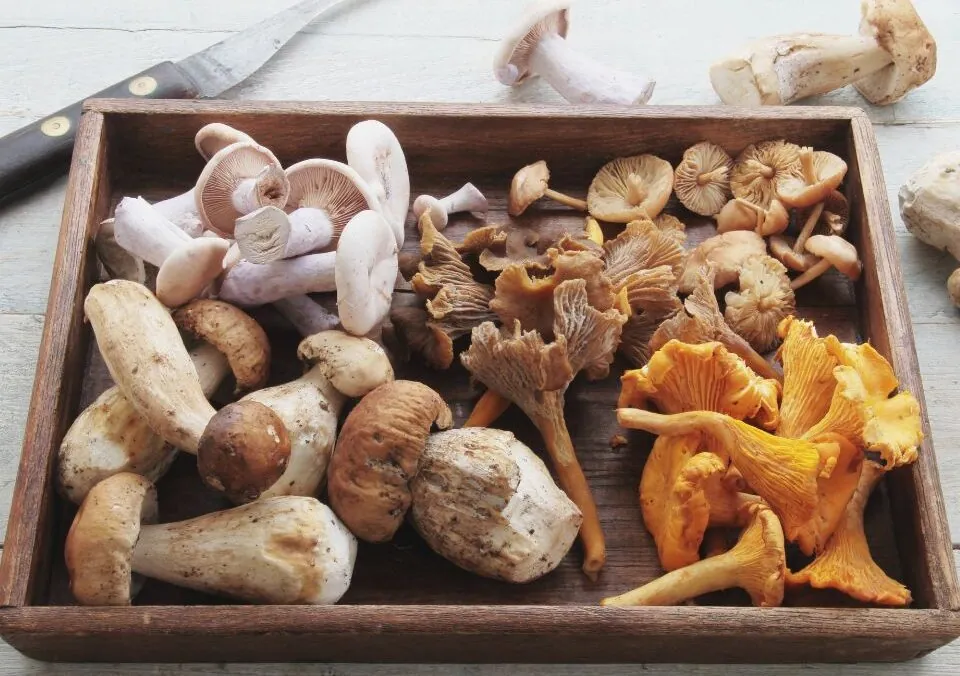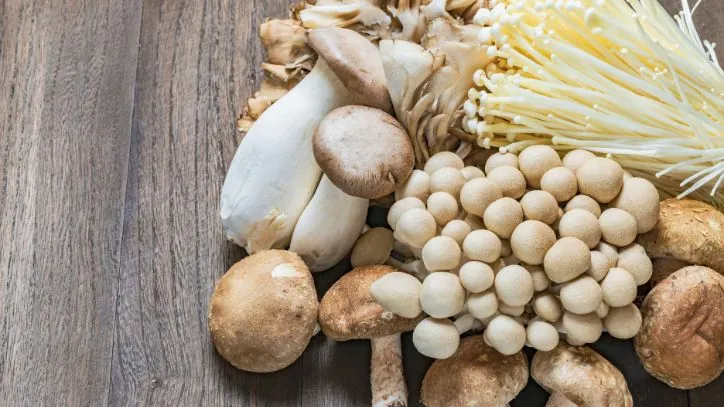Blog
What Nutrition is in Mushrooms? Nature’s Low-Calorie Powerhouses

Mushrooms have long been a curiosity, popping up in fairy tales as enchanted homes for woodland creatures or as potent ingredients in ancient potions. But beyond their whimsical reputation, these fungi are not vegetables, but a kingdom all their own, offering a bounty of nutrition that rivals many superfoods.
When I was young, I wanted to grow herbs and mushrooms. I eventually got a handle on growing a little herb garden, but I never tackled the mushrooms. This mysterious fungus remains mysterious to me, but I love eating a variety of mushrooms!
From the humble white button mushroom in your supermarket salad to exotic varieties like shiitake and maitake foraged in forests, mushrooms are low in calories yet brimming with vitamins, minerals, proteins, and bioactive compounds.
In a world obsessed with kale and quinoa, mushrooms deserve their moment in the spotlight. They’re not just tasty additions to stir-fries or pizzas; they’re nutritional dynamos that can boost immunity, support heart health, and even aid in cancer prevention. Let’s delve into what makes mushrooms a dietary gem, exploring their nutrient profile, health benefits, and how to make them a staple in your meals.
Macronutrients: The Building Blocks in Mushrooms
At first glance, mushrooms seem unassuming: mostly water, comprising about 90% of their weight. But strip away the moisture, and you’ll find a solid foundation of macronutrients that make them an excellent choice for weight management and sustained energy. According to nutritionists, a standard serving of one cup (about 70 grams) of raw mushrooms clocks in at just 15 calories, with a mere 0.2 grams of fat. This low-calorie density means you can pile them on without guilt, making them ideal for calorie-conscious eaters.
Protein is where mushrooms shine for plant-based diets. That same cup provides around 2.2 grams of protein, which might not sound like much, but it’s comparable to many vegetables and includes all essential amino acids in varying amounts. Varieties like oyster mushrooms boast even higher protein levels, sometimes up to 3 to 4 grams per 100 grams, positioning them as a meat alternative in vegan recipes.
Carbohydrates come in at about 2.3 grams per serving, mostly as fiber and complex sugars like beta-glucans. Unlike starchy veggies, mushrooms have a low glycemic index, helping stabilize blood sugar levels.
Fat content is negligible, but what little there is includes healthy polyunsaturated fats. Overall, mushrooms’ macronutrient profile supports everything from muscle repair to digestive health, all while keeping things light and satisfying.

Vitamins: A Fungal Pharmacy of Essentials
Mushrooms are vitamin vaults, particularly rich in B vitamins that fuel metabolism and brain function. Riboflavin (B2), niacin (B3), pantothenic acid (B5), folate (B9), and thiamine (B1) are abundant across varieties.
For instance, a serving of cremini mushrooms can deliver up to 20% of your daily niacin needs, which helps convert food into energy and supports skin health.
These B vitamins are crucial for red blood cell production and nerve function, making mushrooms a boon for vegetarians who might miss out on animal-derived sources.
But the real standout is vitamin D, often called the “sunshine vitamin.” Mushrooms are one of the few non-animal sources that naturally produce vitamin D when exposed to UV light. Wild or sun-dried shiitake mushrooms can contain over 400 IU per serving—more than a glass of milk.
This is vital for bone health, as vitamin D aids calcium absorption. In regions with limited sunlight, like northern climates, incorporating UV-exposed mushrooms can help prevent deficiencies linked to fatigue and weakened immunity.
Fun fact: You can “sunbathe” store-bought mushrooms yourself. Place them gill-side up in sunlight for 15 to 30 minutes to boost their vitamin D content exponentially.
Other vitamins like C and E appear in trace amounts, adding antioxidant perks.
Minerals: Trace Elements with Big Impacts
Minerals in mushrooms read like a periodic table of health boosters. Selenium tops the list, with a single serving providing up to 30% of your daily needs; this antioxidant mineral protects cells from damage and supports thyroid function.
Copper follows closely, essential for iron absorption and connective tissue formation—shiitake mushrooms are particularly rich, offering about 72% of the RDA per 100 grams.
Potassium, the blood pressure regulator, is plentiful too. Portobello mushrooms rival bananas, with around 500 mg per cup, helping balance sodium intake and reduce hypertension risk.
Phosphorus for bone strength, zinc for immune support, and magnesium for muscle relaxation round out the lineup.
Mushrooms also contain iron, though in non-heme form, which is better absorbed with vitamin C-rich foods.
These minerals work synergistically; for example, selenium and copper enhance antioxidant defenses, potentially lowering chronic disease risks.
Bioactive Compounds: The Secret Weapons
Beyond basics, mushrooms harbor unique compounds like ergothioneine and glutathione—powerful antioxidants that combat oxidative stress and aging. Ergothioneine, dubbed the “longevity vitamin,” is concentrated in mushrooms and may protect against neurodegenerative diseases. Beta-glucans, soluble fibers in the cell walls, modulate the immune system by activating white blood cells. Maitake mushrooms are beta-glucan powerhouses, traditionally used in Japanese medicine for vitality. Polysaccharides and polyphenols add anti-inflammatory and anti-cancer properties, with studies showing mushrooms may inhibit tumor growth.
Health Benefits: From Immunity to Longevity
The nutrients translate into tangible benefits. Mushrooms bolster immunity via beta-glucans and selenium, potentially reducing cold duration. Their anti-inflammatory effects aid gut health, fostering beneficial bacteria.
For heart health, potassium and fiber lower cholesterol and blood pressure. Antioxidants like ergothioneine may ward off cancer by neutralizing free radicals. Weight loss? Their low calories and high fiber promote satiety. Brain benefits include B vitamins staving off cognitive decline.
Varieties: A Spectrum of Nutrition
Not all mushrooms are equal. White button mushrooms, the most common, are nutrient-dense starters with high selenium. Cremini, their browner cousins, amp up antioxidants.
Portobellos, mature creminis, excel in potassium and umami flavor. Shiitake lead in nutrient density, packed with vitamin D and copper. Oyster mushrooms offer iron and zinc for anemia prevention. Maitake, or “hen of the woods,” shine with beta-glucans for immunity. Wild varieties often have higher nutrients than farmed, but all benefit from sunlight exposure.
Incorporating Mushrooms into Your Diet
Versatility is key. Sauté white buttons with garlic for a side dish, grill portobellos as burger patties, or brew shiitake tea for a savory broth. Add them to soups, salads, or omelets for nutrient boosts. Aim for 1 to 2 servings weekly, but cook them to reduce potential toxins in raw forms.
Recipes to try: A maitake stir-fry with veggies for immune support, or stuffed creminis with quinoa for protein punch.
Mushroom Farms in Arizona
Based on recently checking various online directories, articles, and farm listings, there are at least 15 identifiable mushroom farms or producers in Arizona that grow and sell mushrooms. Most sell their produce at local farmers markets and direct.
Below is a list of their names, brief descriptions where available, and websites (or alternative contact pages if no dedicated site exists).
- Arizona Mushroom Co. – Founded in 2020 in Payson; grows shiitake, lion’s mane, and other varieties.
- Sun Valley Harvest LLC – Urban farm in Glendale since 2015; specializes in gourmet mushrooms like oyster and cordyceps.
- Southwest Mushrooms – Phoenix-based urban farm offering fresh gourmet and medicinal mushrooms, grow kits, and tinctures.
- Hypha Foods – Phoenix producer of rare gourmet mushrooms, truffles, and foraged items; supplies restaurants and markets.
- Desert Pearl Mushrooms – Small-scale farm in Tucson focusing on culinary and medicinal mushrooms.
- Phoenix Mushroom Farm – Family-run farm in Scottsdale growing lion’s mane, oyster, and chestnut mushrooms.
- BKW Farms – Marana farm with a climate-controlled mushroom grow house for year-round production, including blue oyster and lion’s mane.
- Sonoran Mushroom Company – Family-owned in the Sonoran Desert area; grows small-batch oyster mushrooms.
- Symbiotic Farms – Offering mushroom farming and educational services since 2012.
- AZ Mushroom Farm aka Fungi-licious – Family-owned cultivation lab and farm in Chino Valley; focuses on culinary mushrooms.
- Aravaipa Creekside Growers – Formerly Old Pueblo; grows mushrooms in Dudleyville.
- Sunset Mushrooms – Established in 2024; offers gourmet mushrooms like lion’s mane and cultivation supplies.
- Rhiba Farms – farm in San Tan Valley growing blue oyster, king oyster, and pearl oyster mushrooms alongside other produce.
- White Harte Farms – Produces exotic mushrooms, lettuce, herbs, and microgreens. You can find them in directories like Good Food Finder.
- Allred Family Fungi – Home-grown edible mushrooms can also be found in the Good Food Finder directory.
Conclusion: Embrace the Fungal Revolution
Mushrooms aren’t just food; they’re a nutritional revolution in disguise. With their array of vitamins, minerals, and compounds, they offer a low-effort way to enhance health.
Whether you’re chasing better immunity, weight control, or simply more flavor, these earthly delights deliver. Next time you spot them at the market, remember in the kingdom of fungi, nutrition reigns supreme. Dive in and let mushrooms work their magic on your plate and your well-being.
By Julie Murphree, Arizona Farm Bureau Communications Director


















